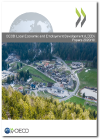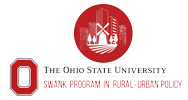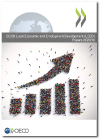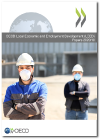Développement économique et création locale d’emplois (LEED)
The Spatial Productivity Lab at the OECD Trento Centre
An explicit focus on subnational drivers of regional productivity is needed to better understand recent productivity dynamics (e.g. growing disparities within countries) and to devise policy solutions that boost aggregate productivity and reduce inequalities
Productivity is the main determinant of living standards. Economies that are more productive generate greater ability to support and enhance wellbeing of their citizens via higher incomes, better infrastructure, more services and improved sustainability of welfare systems. In the last decade, the OECD countries have been confronted with decreasing productivity growth, declining business dynamism and job reallocation rates, and increasing regional productivity disparities. Large cities tend to prosper, while smaller places often feel left behind. Yet, all places have growth potential. A focus on productivity of places or spatial productivity allows to understand and put to work local and regional engines of growth. This will expand economic opportunities in all places while decreasing inequalities. Knowledge of subnational productivity drivers in different types of places is crucial for building back better and making the post-COVID world more prosperous, resilient and inclusive.
|
Ongoing project
|
This three-year project, led by the Spatial Productivity Lab at the OECD Trento Centre for Local Development, aims to carry out analysis on the productivity of the Autonomous Province of Trento in Italy, propose policy measures, offer discussion opportunities among stakeholders and produce an annual report on productivity and competitiveness of the Trentino economy. Implementation period: 2023-2025 |
Spatial Productivity Lab papers
|
A small group of small and medium-sized enterprises (SMEs) that grow fast over a short period of time, i.e., scalers, make an outsized contribution to job creation and economic growth. This paper provides a portrait of scalers in the Italian region of Trentino-Alto Adige/Südtirol, and its two autonomous provinces: Trentino and Bolzano-Bozen. The region hosts and attracts a dynamic population of scalers. Around one in nine SMEs in Trentino-Alto Adige/Südtirol is an employment scaler, and more than one in six is a turnover scaler. However, the contribution of the fastest-growing scalers is lower than in the rest of Centre and North Italy, which is in part due to the sectoral specialisation of scalers in the region. |
 Bringing Trentino’s productivity growth back on track Bringing Trentino’s productivity growth back on trackA comparison among "peer" regions April 2024 The Autonomous Province of Trento (Trentino) is among the most productive regions in Europe, but over the past two decades its productivity growth has stagnated. As a result, the productivity gap of Trentino widened by over 20% compared to regions with the same productivity level in 2000. The benchmarking of productivity drivers in Trentino with those of “peer” regions points to several policy priorities, including: reviving productivity in tradeable sectors, also through increased internationalisation; increasing the share of the labour force with a tertiary education; and getting more out of public R&D while boosting private sector R&D. Available also in Italian |
This paper assesses the comparability and validity between Lightcast and other data sources for Austria, Belgium, Bulgaria, Germany, Hungary, the Netherlands, Portugal, Romania, Spain and Sweden, for the years 2019 to 2022 across regions, sectors and occupations. It concludes with some recommendations for labour market analysts that want to use data on online job postings for assessing labour demand trends. |
|
This paper presents the first international assessment of the Lightcast vacancy data representativeness based on benchmarking against officially reported vacancy data in Australia, Canada, the United Kingdom and the United States. The analysis compares distributions in the Lightcast data versus official data across large (TL2) regions, industrial sectors and occupational categories. |
This paper estimates the impact of mass lay-offs between 2008-18 across small regions (TL3) in Europe on regional employment and productivity. Mass lay-offs from firms and plant restructuring occur regularly and can have potentially large consequences on places and communities. Policy makers may consider supporting firms, in order to prevent mass lay-offs but at the risk of interfering with economic dynamism, or targeting affected workers, to help them transition to new employment. |
This paper reviews the empirical evidence for effective policies from across the OECD to strengthen local economic resilience through support for people, firms and places. There is a strong need for effective policies in times of recessions, natural disasters and long-term structural change. Policies that strengthen economic resilience strongly overlap with policies for local productivity growth and vice-versa. Moreover, some policies aiming to increase resilience through adding redundancy in production or infrastructure can serve productivity in the long-term. |
|
The spatial dimension of productivity in Italian co-operatives This report explores the spatial dimension of productivity in the co-operatives of Italy, a country where they make up a relatively large share of total national employment. Co-operatives play a countercyclical role in job creation during crises. In a post-pandemic world, they could make a major contribution to steering the economy towards inclusiveness and sustainability. Productivity growth ensures that co-operatives can achieve both economic and social goals in the future. This report applies a place-based approach to investigate the issue of productivity in co-operatives, given their many interdependencies with local communities. Available also in Italian |
This paper advances our understanding of the spatial dimension of productivity by investigating the link between subnational governance arrangements and urban labour productivity. It presents a detailed study of the direct and indirect effects of decentralisation (local autonomy), government quality and fragmentation and empirically demonstrates the need for a comprehensive approach when considering the effects of governance-related characteristics on regional economic outcomes. |
This paper explores patterns of short-term labour demand weakening in Metropolitan Statistical Areas (MSAs) of the United States and the associated regional factors. The paper considers online job vacancy postings in February-June 2020. The data show that in larger MSAs, online job postings contracted more and the recovery was slower compared to smaller MSAs. Non-tradable service occupations, particularly those involving face-to-face interactions, contracted the most. The regression analysis reveals that different metropolitan characteristics were associated with the initial drop (February-April) and the recovery (May-June) in online job posting. |
|
This paper advances our knowledge of the spatial determinants of productivity by empirically demonstrating one such mechanism – clear differences along the urban-rural continuum in the sensitivity of SMEs’ investments to own cash flow. Whereas the literature has established uneven availability of credit across space, the evidence on whether this translates into differences in actual business investments remains scarce. We answer this question in the context of Sweden – a highly digitalised country with low regional inequalities. |
The paper examines the effects of three groups of factors (county economic structure, social/demographic attributes and geography) on employment growth and poverty change in US counties before and after the Great Recession. It finds that the industrial structure that facilitates inter-industry employee flows (“rewiring”) is of increasing importance post-Recession. In particular, this measure is associated with employment growth in under-performing counties suggesting that removing barriers to the flow of resources within lagging economies and increasing their adaptability potential might be a viable policy option. |
This working paper offers a synthesis of the current knowledge on the determinants of productivity. It carefully reviews both “spatial” (e.g. agglomerations, infrastructure, geography) and “aspatial” (e.g. human capital, labour regulations, industry-level innovation and dynamism) productivity drivers and demonstrates how the underlying spatial dynamics behind the latter group makes all productivity determinants “spatial” in nature. The paper demonstrates that productivity is inherently a spatial phenomenon and its understanding without a local/regional dimension is incomplete. |
The Network
This activity is implemented in co-operation with national institutions in Italy and in interested OECD countries; as well as with regional authorities of Trentino Alto Adige Sudtirol, other regions in Italy and other OECD countries. The research team includes economists and related researchers detached from OECD and other relevant research centres, universities in Italy and internationally.
Contact
Interested in partnering with the Spatial Productivity Lab at the OECD Trento Centre? Contact Carlo.Menon@oecd.org and Wessel.Vermeulen@oecd.org.
SPL Partners
 |
 |
 |
 |
 |
 |
 |
 |
 |
 |
 |
 |
 |
 |
|
Documents connexes













